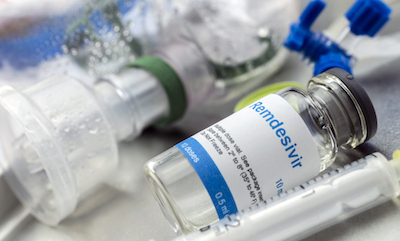Remdesivir Could Save More Lives Where ICUs Are Overwhelmed.

Amid news that the United States has bought up virtually the entire global supply of remdesivir, a new School of Public Health study outlines how the drug could save lives in countries with less hospital capacity, such as South Africa, where COVID-19 is beginning to overwhelm intensive care units (ICUs).
Previous research has suggested that remdesivir can reduce deaths from COVID-19 by as much as 30 perent, but has a more significant effect on how long patients need intensive care, from an average of 15 days down to an average of 11 days.
The new peer-reviewed study, published in the journal Clinical Infectious Diseases, estimates that this ability to shorten ICU stays could increase the number of patients treated in South Africa’s ICUs by more than 50 percent.
This increased capacity could save as many as 6,862 lives per month as the country’s cases peak. Add to that the potential lives saved directly from remdesivir treatment, and the drug could prevent the deaths of as many as 13,647 South Africans by December.
“There are many countries with limited ICU capacity that could benefit from this double impact on mortality,” says study lead author Brooke Nichols, assistant professor of global health.
“Why would you use a drug—that has limited availability—to save one life when that same drug could be used to save two lives?”
Nichols says she is worried by the news that the US has bought up the remdesivir supply, especially if the government doesn’t even make sure that priority goes to overwhelmed US locations.
“Because more lives can be saved per person treated when using remdesivir in places where ICU resources are breached, using remdesivir when ICU resources are not breached would be a misallocation of scarce resources,” she says.
Nichols and study co-authors in Boston and South Africa, including Gesine Meyer-Rath, research associate professor of global health, have been modeling South Africa’s COVID epidemic to help the country’s government make informed decisions. They previously predicted that the country’s ICU capacity could be overwhelmed as early as this month. The hardest-hit province, the Western Cape, exceeded ICU capacity in June.
For the remdesivir study, the researchers used their South African National COVID-19 Epidemiology model to look at the estimated three to six months when severe cases will exceed the country’s 3,450 available ICU beds. If every one of South Africa’s ICU patients with COVID received remdesivir, reducing the average ICU stay, the researchers estimated that the number of patients treated in ICUs from June to December would increase from between 23,443 and 32,284 patients to between 36,383 and 47,820.
The mortality rate for COVID-19 in ICUs varies from country to country and hospital to hospital, so the number of lives saved from increased ICU capacity would also vary. The researchers modeled several different scenarios, finding increased ICU capacity in South Africa could save 685 lives per month if a patient who needed intensive care was just as likely to die in an ICU than outside of one. At the other extreme, the researchers estimated that the increased ICU capacity from remdesivir could save as many as 6,682 lives per month if almost all patients who required but didn’t receive ICU care died, but those who did receive ICU care had a 50-50 change of surviving.
If direct treatment with remdesivir also saved the lives of an additional 30 percent of patients—the current estimate for the drug—then the researchers estimated that remdesivir’s “double impact” could save as many as 13,647 lives in South Africa by December.
That is, if South Africa’s hospitals can get remdesivir in the first place.
The study’s other co-authors are Gabriella Rao, research assistant in the Department of Global Health; Lise Jamieson and Ian Sanne of the University of the Witwatersrand in Johannesburg; Sabrina Zhang of the Massachusetts College of Pharmacy and Health Sciences; Sheetal Silald of the University of Cape Town and the University of Oxford; and Juliet R.C. Pulliam of Stellenbosch University in Stellenbosch, South Africa.